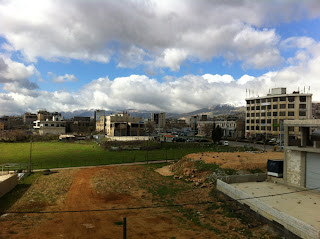 |
| Makeshift tents adjacent to the Syrian border |
 |
| An earlier map. Since this map was produced, refugee numbers have risen significantly as the conflict has worsened |
On the Jordanian border the picture looks somewhat different but no less challenging, with many refugees being settled in large camps in addition to being hosted by local Jordanian communities.
Access and 'humanitarian space' for international organisations to operate in Syria is very limited at present, but a number of local Syrian organisations and churches continue to be very active in providing support on the ground. Last week we met with a number of these groups, and heard some remarkable stories of how communities are mobilising and organising themselves to provide makeshift medical, food, shelter, schooling and other emergency services. This local activism and community mobilisation has been evidenced in many places across Syria. One group told us how various Syrian churches are providing meals and other life saving support to thousands of muslim families currently accommodated in mosques and other emergency shelters. The group's response when asked how best to help in Syria? "Help the Christians to help the Muslims".
The fabric of Syrian society has collapsed, but it is a powerful and humbling thing to see groups across the spectrum of faith supporting each other in this way.
 |
| WV 'Child Friendly Spaces' provide support for refugee children affected by the conflict. |
When we met last week with the Syriac Orthodox Archbishop in Beirut, his final words were:
"No one knows the future in Syria, but God know's the future. So we have to trust in Him. May God have mercy on us".
*with apologies to Robert Fisk, author of 'Pity the Nation, Lebanon at War'
 |
| Emergency accommodation for refugees in the Bekaa Valley, Lebanon |
 |
| Emergency shelter for a family of six |


keep up with the wonderful work that wv are doing to help these poor and desperate people. may peace come soon to this much troubled country and region.
ReplyDelete